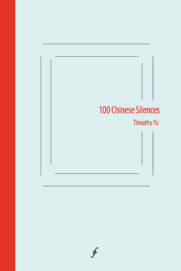 Timothy Yu
Timothy Yu
Les Figues ($17)
by John Bradley
“If you are not having a fight with somebody, then you are not sure whether you are alive when you wake up in the morning,” claims Tom Wolfe. If Wolfe is right, then Timothy Yu must wake up each morning wearing boxing gloves—at least that’s how the poems in 100 Chinese Silences come across. The poems can be read in several ways: as stand-alone works; as parodies of other poems (eighty-seven of the “Chinese Silences” target a particular poem, which Yu names); or as texts designed to prompt debate about cultural appropriation.
Many poets are guilty, in Yu’s eyes, of perpetuating Chinese cultural and literary stereotypes: Billy Collins (who inspires by far the most poems—twenty-three), Ezra Pound, Marianne Moore, Hayden Carruth, Gary Snyder, Kevin Stein, Mary Oliver, Norman Dubie, and many others. At times, Yu’s satire is right on target, although often the satire feels too broad to be effective, and the author goes after poets whose sole offense seems to be that they were influenced by Chinese poetry.
Ezra Pound, whose interest in Chinese and Japanese poetry helped shape Imagism and Modernism, took great liberties in his Chinese translations and deserves to be lampooned, as he is in “Chinese Silence No. 87”: “And E.P. also died silent. / He tried to embrace an empire / In an ideogram.” Pound, using the notes of Ernest Fenollosa—an “American Orientalist,” to use a term from Fenollosa’s lifetime—believed that Chinese ideograms presented a visual picture of a word or phrase; Yu nicely skewers this fallacy in just two lines.
Much of Yu’s satire, however, is painted with a broad brush, as can be seen in this excerpt from “Chinese Silence No. 19,” which targets Billy Collins and his poem “Kathmandu”:
Meanwhile the Laureate is riding
in the backseat of a New York taxi
blackening his lashes with ink
and pulling his eyes up at the corners . . .
Here’s the passage in Collins’s poem that prompts Yu’s satire:
On the ride back to the hotel,
in the backseat of a taxi
I blackened one of my thumb pads
with a pen and then pressed it to my forehead,
to show the world my belief
that even though we will all turn to ashes,
there may be an afterlife for some of us—
Yes, Collins’s depiction of using ink to create a dark spot on his forehead to imitate a religious rite is offensive. But so is Yu having Collins “pulling his eyes up at the corners.” Does one offensive act justify another?
More problematic is when Yu implies that some poets are guilty of cultural appropriation for use of the word “China” or “Chinese,” as in “Chinese Silence No. 35,” written “After Dan Gerber, ‘Often I Imagine the Earth’”:
Often I run out of ideas
for poems and the metaphors they’re made of—
clichés, dull
clichés everywhere—
but then I remember I am an American
and so can end my poem with something Chinese
and call it original, like that
ancient American railroad
built miraculously by silent hands,
helping me drive my golden spike home.
Here is the full text of Gerber’s “Often I Imagine the Earth”:
Often I imagine the earth
through the eyes of the atoms we’re made of—
atoms, peculiar
atoms everywhere—
no me, no you, no opinions,
no beginning, no middle, no end,
soaring together like those
ancient Chinese birds
hatched miraculously with only one wing,
helping each other fly home.
The image in the eighth line appears to have triggered Yu’s anger and derision, raising the following questions: Is the poem riddled with clichés? Is the use of “ancient Chinese birds” an act of cultural appropriation? And what does Gerber or his poem have to do with the racist treatments of Chinese laborers to build the American railroad? While readers will no doubt vary in their responses to these issues, Yu’s spoof is more a springboard for his agenda rather than a critique of Gerber’s poem.
One poet is conspicuous in his absence. I’m referring to Michael Hudson, who had a poem selected by Sherman Alexie for the 2015 Best American Poetry. Hudson stated in the issue that he uses a Chinese woman’s name—Yi-Fen Chou—when he cannot get a poem published under his own name. Hudson certainly deserves inclusion here.
100 Chinese Silences works best when read as a work provoking debate on literary issues often ignored. However, if Yu’s satire is meant to intimidate or silence—quite ironic given his use of this term through the book—and to steer poets away from reading or being influenced by Chinese poetry, then his book does a disservice to the literary community.
